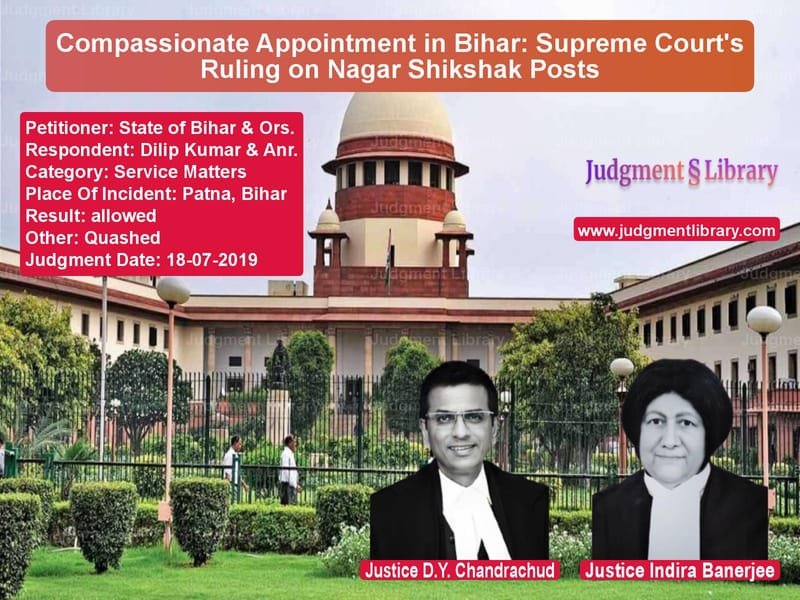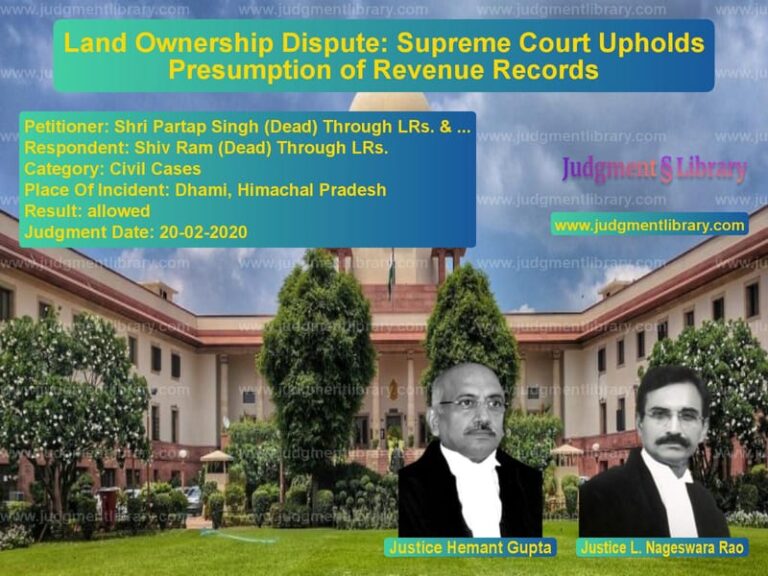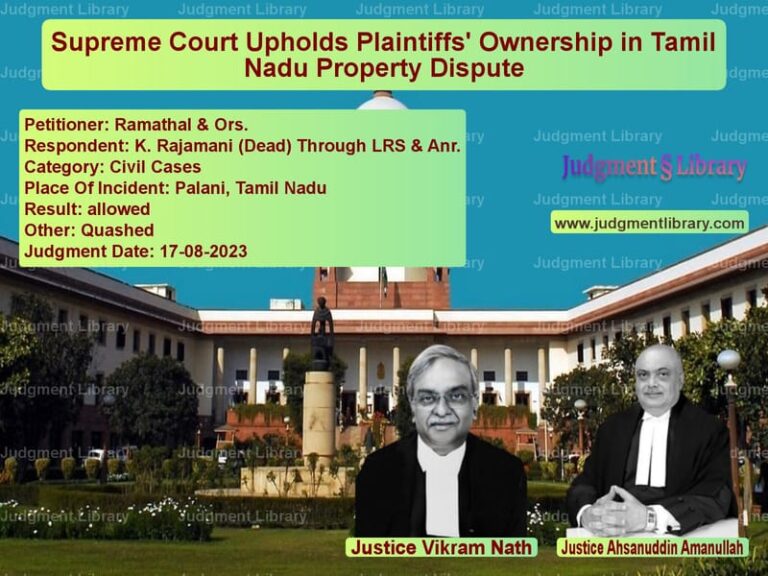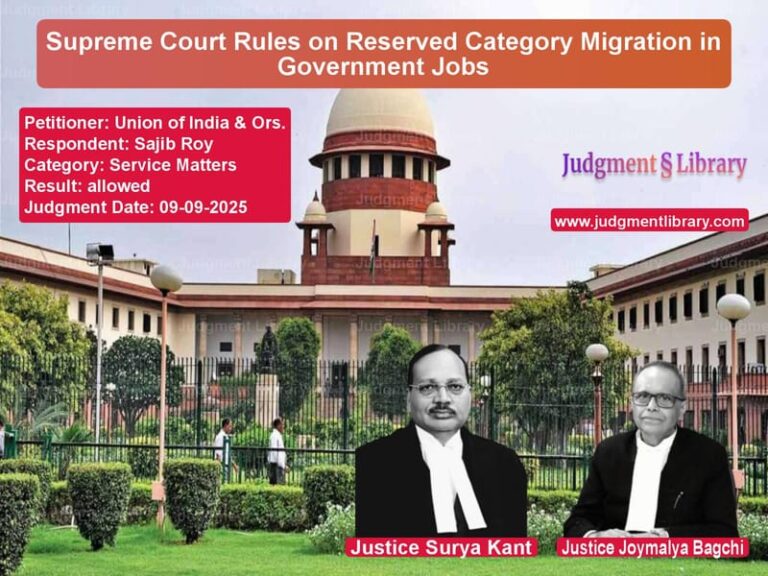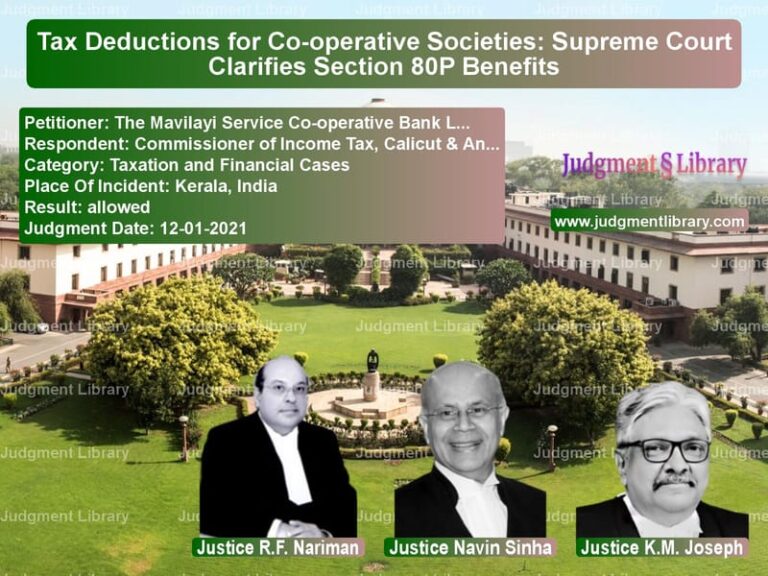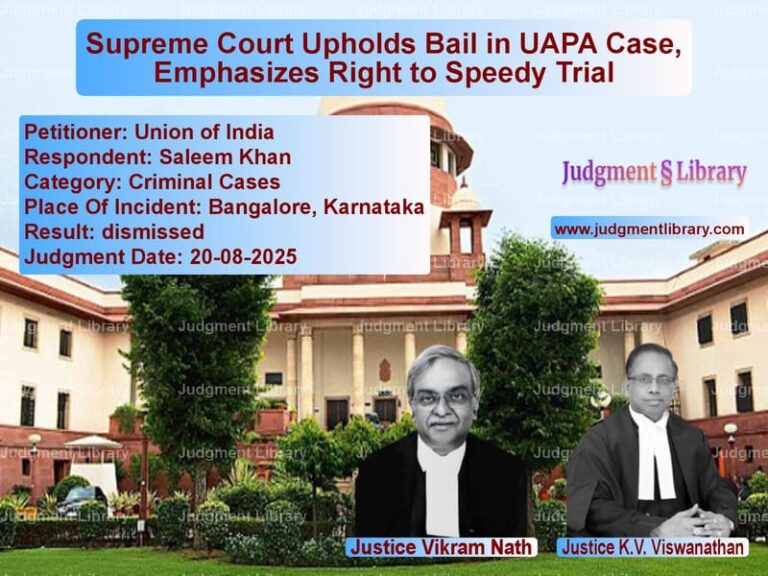Compassionate Appointment in Bihar: Supreme Court’s Ruling on Nagar Shikshak Posts
The case of State of Bihar & Ors. v. Dilip Kumar & Anr. deals with the issue of compassionate appointments in the state of Bihar and whether dependents of deceased government employees can claim appointments in government service or only in fixed-pay positions under the 2006 rules. The Supreme Court was tasked with determining whether the High Court was correct in directing that the respondents be appointed to government posts rather than as Nagar Shikshaks (town teachers) under the Bihar Panchayat Primary Teacher Employment and Service Conditions Rules, 2006.
Background of the Case
The first respondent’s father, an Assistant Teacher in a primary school, passed away on 07.05.2006 while in service. Similarly, the second respondent’s mother, also an Assistant Teacher in a primary school, died on 09.09.2006. Following their applications for compassionate appointment, the District Compassionate Appointment Committee (DCAC) considered their cases and offered them employment as Nagar Shikshaks under Rule 10 of the Bihar Panchayat Primary Teacher Employment and Service Conditions Rules, 2006.
The respondents accepted these posts but later filed a writ petition before the Patna High Court, arguing that they should have been appointed to government posts under the state’s regular pay scale. They contended that the post of Nagar Shikshak was not a regular government post and provided only fixed emoluments.
The Single Judge of the High Court ruled in favor of the respondents, directing that they be appointed in government service. The State of Bihar challenged this decision before the Division Bench, which upheld the Single Judge’s ruling. The State of Bihar then appealed to the Supreme Court.
Petitioner’s Arguments
The State of Bihar argued that:
- Appointments on compassionate grounds must follow the Bihar Panchayat Primary Teacher Employment and Service Conditions Rules, 2006.
- Under Rule 10 of the 2006 Rules, dependents of deceased government employees are eligible for appointment as Nagar Shikshaks rather than to regular government posts.
- Once the respondents accepted appointments as Nagar Shikshaks, they could not later claim appointments in government service.
- The High Court erred in granting a relief that was contrary to the statutory rules.
Respondent’s Arguments
The respondents countered that:
- They were entitled to appointment in government service based on compassionate grounds.
- The government had issued a circular on 17.10.2008 stating that compassionate appointments should be to regular government posts.
- The High Court had previously granted similar relief in other cases, and those judgments had not been overturned.
Supreme Court’s Observations
The Supreme Court examined whether the respondents’ claim to government service was valid given that they were appointed after the 2006 Rules had come into force. The key findings were:
- The 2006 Rules explicitly provided that compassionate appointments could be made to the posts of Nagar Shikshaks, and these rules superseded all previous instructions.
- The respondents were appointed as per the legal framework existing at the time and had accepted their appointments.
- The High Court erred in relying on an instruction dated 17.10.2008, which was later withdrawn by the government.
- In a similar case, Mukesh v. State of Bihar (2017) 5 SCC 383, the Supreme Court had ruled that appointments made under the 2006 Rules must comply with those rules and could not be converted into government service positions.
The Supreme Court observed:
“Appointments made under the statutory rules must be in accordance with those rules. The High Court erred in granting relief that was contrary to the governing regulations.”
Final Judgment
The Supreme Court allowed the appeal and set aside the High Court’s judgment. It ruled that:
- The respondents’ appointments as Nagar Shikshaks were valid and in accordance with the law.
- The respondents could not demand appointment in regular government service.
- The respondents were at liberty to approach the State Government for any other relief under the applicable rules.
Impact of the Judgment
This ruling has significant implications for compassionate appointments in Bihar and across India:
- Reaffirms that appointments must be made strictly in accordance with statutory rules.
- Prevents the bypassing of recruitment rules through judicial orders.
- Clarifies that dependents of deceased employees cannot claim government service if rules specify alternative employment.
- Ensures that compassionate appointments remain within the framework established by the government.
Conclusion
The Supreme Court’s ruling in this case ensures that compassionate appointments in Bihar are carried out strictly in line with the 2006 Rules. By upholding the statutory framework, the judgment maintains the integrity of government recruitment processes and prevents judicial intervention from altering legally defined employment criteria.
Petitioner Name: State of Bihar & Ors..Respondent Name: Dilip Kumar & Anr..Judgment By: Justice D.Y. Chandrachud, Justice Indira Banerjee.Place Of Incident: Patna, Bihar.Judgment Date: 18-07-2019.
Don’t miss out on the full details! Download the complete judgment in PDF format below and gain valuable insights instantly!
Download Judgment: State of Bihar & Ors vs Dilip Kumar & Anr. Supreme Court of India Judgment Dated 18-07-2019.pdf
Direct Downlaod Judgment: Direct downlaod this Judgment
See all petitions in Recruitment Policies
See all petitions in Public Sector Employees
See all petitions in Education Related Cases
See all petitions in Judgment by Dhananjaya Y Chandrachud
See all petitions in Judgment by Indira Banerjee
See all petitions in allowed
See all petitions in Quashed
See all petitions in supreme court of India judgments July 2019
See all petitions in 2019 judgments
See all posts in Service Matters Category
See all allowed petitions in Service Matters Category
See all Dismissed petitions in Service Matters Category
See all partially allowed petitions in Service Matters Category

